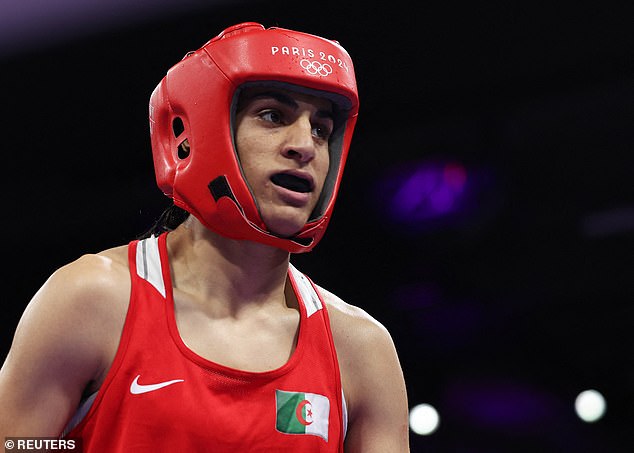Forty-six seconds was enough for Angela Carini. Enough for two right hands from Imane Khelif, the boxer her friends and family had been telling her to avoid all week because “she’s a man,” to find their mark. Enough for those blows to dislodge a chin strap, send her reeling backward and leave her blue shorts splattered with blood.
Enough time to tell her trainer that she was finished, to sink to her knees in the middle of the ring in apparent protest, to tear up the canvas in despair and to burst into a flood of tears that continued after she had spoken to reporters and had gone, disconsolately, to the locker room.
Hopefully it will also be enough for Olympic chiefs to take a serious look at a disaster that is entirely their fault.
“It hurt so much,” said Carini, anguished, holding her nose. “After the second punch I couldn’t breathe anymore. I went to my coach and told him ‘enough’ because it takes maturity and courage to stop. I didn’t feel like fighting anymore… I had never felt a punch like that.”
Never in the history of Olympic women’s boxing has a welterweight (66kg) showdown between an Algerian and an Italian generated so much interest. The press box at the Arena du Nord in Paris, just a short distance from Charles de Gaulle airport, was packed with journalists from around the world who stretched out to watch the spectacle.
Imane Khelif, one of two female boxers involved in an Olympic eligibility dispute, won her first boxing match of the Games after her opponent retired in the first round on Thursday.
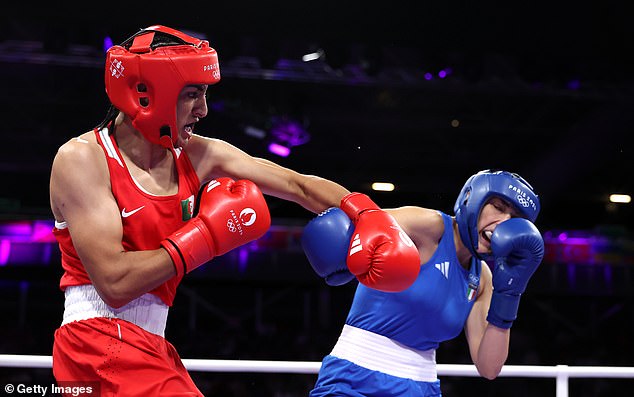
Khelif landed two brutal blows on Angela Carini before the fight was stopped.
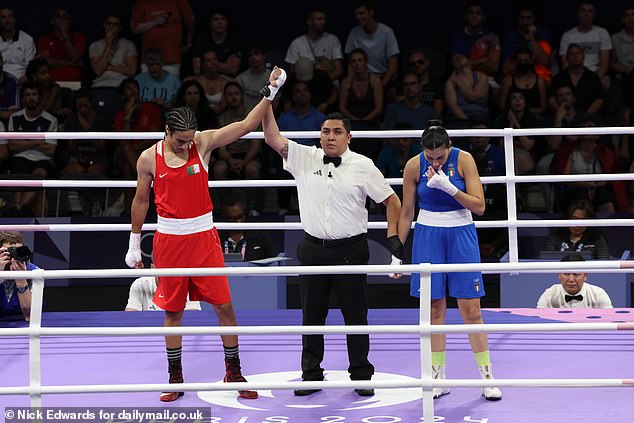
Italian boxer Carini abandoned the fight after saying that the Algerian’s punches “hurt a lot”
It was a surreal scene. In the anteroom, loudspeakers were blaring high-octane pop songs to a spectacle-seeing crowd, most of whom had come to see other people, and this was one of 28 fights on the card. Arriving from the nearby station, they had played Eye of the Tiger, from the aptly named Survivor song, over a megaphone from a volunteer’s phone.
Khelif, dressed in red and with short black hair, entered first, unbooed from the makeshift stands. Two small groups of Algerians waved their green and white flags, but the cheers were considerably louder when Carini, daughter of a policeman, made her way to the blue corner to the cheerful strains of Volare, which someone had decided to play. The Neapolitan had won silver medals at world and European events. She was no fool. She kissed a glove, looked at the ceiling and made a quick sign of the cross before going into battle. But this was no battle. This was a mismatch from the start.
Khelif commanded the centre of the ring and went to work. After feinting a left, the Algerian caught Carini on the chin with a right. After a pause, Carini gestured to her corner to have her helmet fixed and exchanged words with her trainer. After fixing her strap, she attempted a punch of her own, which was repelled by her lanky opponent, who hit her again with another right to the chin that sent her reeling. Once again, Carini turned to her corner: “Non e gusto,” she said, “it’s not fair,” and that is the central accusation at the heart of the matter.
As Carini knelt in protest, the Olympic announcers abruptly cut to a picture of the Eiffel Tower. This may be a historic moment in itself. Khelif had mixed emotions. “I’m here for the gold, I’ll fight anyone,” the victorious Algerian said. “I’ll fight everyone.”
Khelif and Taiwanese Lin Yu-Tin, who is also competing in Paris, were disqualified from last year’s women’s world championships, with the head of the International Amateur Boxing Association (IBA), Umar Kremlev, who ran that competition, saying further DNA tests had “proved they had XY chromosomes”. In short, they had been deemed “biologically male”.
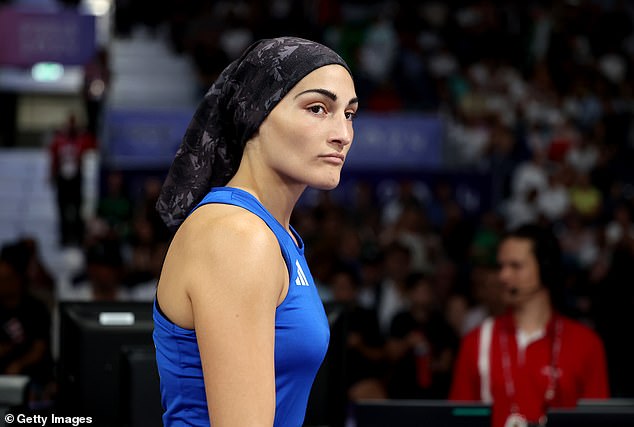
Carini’s trainer told the Italian boxer that it was “too dangerous” to face Khelif
But after a dispute with the IOC, the IBA lost its ability to organise Olympic competitions and here they are both. The IOC rules are considered more lax. Indeed, communications chief Mark Adams had previously warned journalists not to start a “witch hunt” with the seemingly basic explanation that both boxers had “female” on their passports and should therefore be allowed to fight in that category.
These words may not find approval from Carini’s team, as gracious as they were in a questionable defeat. “I’m not one to judge,” she said. “I got in the ring and did my duty as a boxer and tried to fight regardless of any controversy or anything else. I wanted to win.”
After saying he did not know whether her nose had been broken, her coach added: “I have to talk to the girl. But many people in Italy tried to call her and tell her: ‘Please don’t go: he’s a man, he’s dangerous for you’.”
On the eve of the farce, the IBA issued a statement explaining why Khelif and Taiwanese Lin Yu-Tin had been disqualified from the tournament, which was held in New Delhi.
He cited a “meticulous” review that “was extremely important and necessary to maintain the level of impartiality and the highest integrity of the competition.”
The letter adds that no testosterone tests were conducted, but rather “an independent and recognised test, the details of which are being kept confidential”. That test “conclusively indicated that both athletes did not meet the necessary eligibility criteria and were found to have competitive advantages over other competitors”.
The IBA said the ban was also based on tests conducted at the 2022 World Boxing Championships and said, significantly, that Khelif withdrew an appeal to the Court of Arbitration for Sport, making the decision legally binding.
In a critique of the IOC, they “expressed concerns about the inconsistent application of eligibility criteria by other sports organisations, including those overseeing the Olympic Games.” “The IOC’s different regulations on these matters raise serious questions about competitive fairness and athlete safety,” they added. There was nothing to suggest those words were not accurate.
Others had already weighed in ahead of the fight. Australia’s boxing captain Caitlin Parker expressed fear that one of her teammates was fighting in the same 66kg category as Khelif. “I don’t agree with them being allowed to compete in sport, especially combat sports,” Parker said. “It can be incredibly dangerous.”
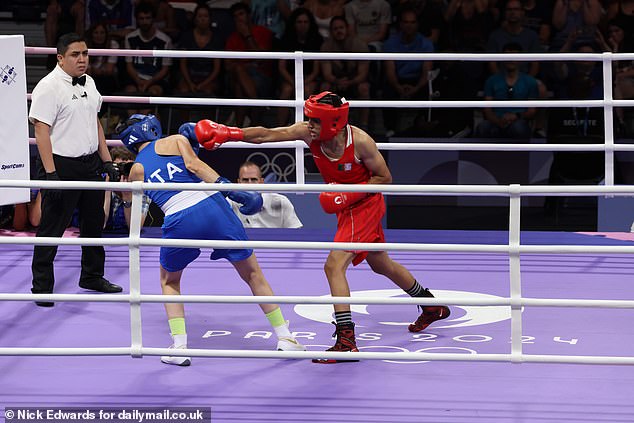
Carini was hit twice in the first round before leaving the fight after 46 seconds.
Italian Sports Minister Andrea Abodi also spoke out on the matter: “In a competition that represents the highest values of sport, the safety of female and male athletes must be guaranteed, as well as respect for fair competition. This will not be the case for Angela Carini.”
He was right and the country’s prime minister was quick to react shortly after the disaster. “Given the high levels of testosterone present in the Algerian athlete, the competition was not a competition, it was not equal,” said Giorgia Meloni.
Perhaps more damaging to the IOC were the post-farce comments from United Nations official Reem Alsalem. The body’s special rapporteur on violence against women and girls expressed concern online, tweeting that Carini had “correctly followed her instincts and prioritised her physical safety, but she and other female athletes should not have been exposed to this physical and psychological violence based on their sex.”
Khelif walked through the mixed zone without answering questions from the press. There should be a level of compassion here, too. There are others who need to explain themselves and possibly take steps to address one of the darkest episodes in Olympic history.


